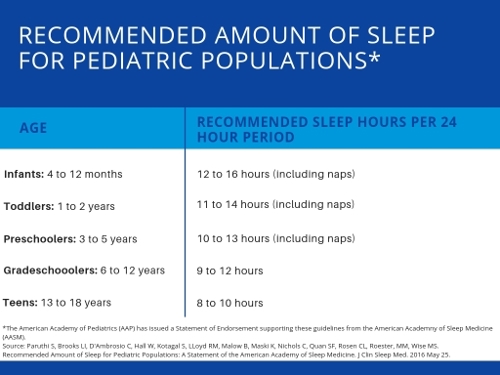
Ask the Expert: Healthy Sleep Habits for Your Child
 Sleep is one of our most basic needs, but is especially vital for children and young adults. Lack of sleep is associated with weight gain and obesity and cognitive and emotional problems like irritability, inattention, hyperactivity, depression, mood swings, aggression and impulse control issues. When it comes to a child’s development, good sleep is extremely important.
Sleep is one of our most basic needs, but is especially vital for children and young adults. Lack of sleep is associated with weight gain and obesity and cognitive and emotional problems like irritability, inattention, hyperactivity, depression, mood swings, aggression and impulse control issues. When it comes to a child’s development, good sleep is extremely important.
Monitoring sleep in children can prove to be a challenge for parents and caregivers. One of the reasons it is so hard to know when our kids aren’t getting enough sleep is that drowsy children don't necessarily slow down the way an adult would. Instead, an over-tired or sleep-deprived child experiences the opposite. They often wind up, acting as though they aren’t tired, resisting bedtime and becoming increasingly hyper as the evening goes on. As a result, sleepiness can often look like symptoms of Attention Deficit Hyperactivity Disorder (ADHD).
But, there are a few things parents can do to help their children become better sleepers and get the rest their growing minds and bodies need:
Establish a structured bedtime routine.
This is critical for children of all ages and a bedtime routine should include structured, consistent timing for evening activities like dinner, bath or shower, reading and lights out. While it may be difficult at first to establish the routine, the long-term effects will far outweigh the initial struggle.
Limit television, video games and all screen time prior to bed.
Exposure to “blue light” can be the most common disruption to sleep, but luckily, it is the easiest to fix. The American Academy of Pediatrics (AAP) recommends keeping all screens -- TVs, computers, laptops, tablets and phones -- out of children's bedrooms, especially at night. Remove portable devices and power down TVs to prevent any temptation to turn them back on when kids “can’t fall asleep.” In fact, all screens should be turned off at least 30 minutes to one hour before bedtime so the brain can transition from an active state to a resting one.
Encourage calming activities before bed.
Encourage activities that calm and soothe your child as bedtime approaches. Bedtime stories and reading to or with your child are a great way to spend time prior to lights out.
Now that your child is asleep, how much sleep do they actually need? The amount varies depending on age, but the American Academy of Sleep Medicine (AASM) and AAP provide some helpful guidelines regarding just how much sleep children need at different stages in their development.

Above all, make sufficient sleep and good health habits a family priority. Be a role model for your child by eating healthy, exercising regularly and establishing a routine bedtime for yourself. Children are acutely aware of your behavior, so modeling healthy habits and creating an environment for them to succeed will ensure everyone in the family is well rested and functioning at their highest level.
If your child is still having trouble sleeping after establishing a strict bedtime routine or displays snoring or loud, heavy breathing, it may be a sign of a medical condition and should be brought to the attention of your child’s medical provider.
Dr. Ellen Davis is a Pediatrician with CaroMont Pediatric Partners in Gastonia, is board certified by the American Board of Pediatrics and is currently accepting new patients. Visit our website to learn more.
